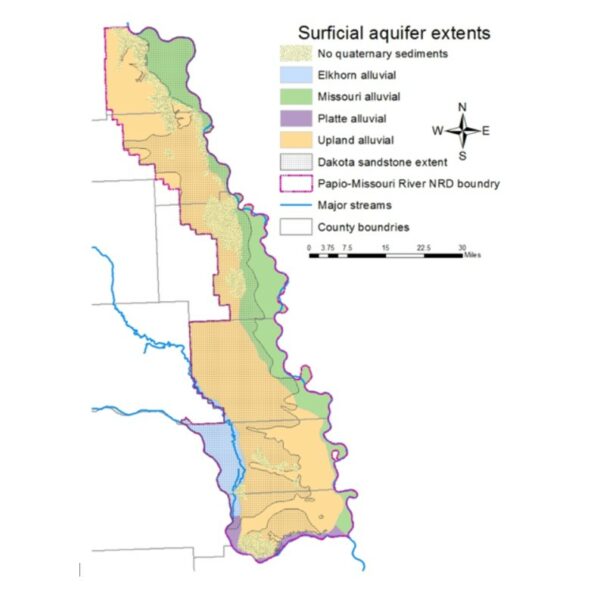By Paul W. Woodward
Papio-Missouri River NRD – Groundwater Management Engineer
Ever wonder what materials or possible contaminants are contained within the water that exists below ground? No need to guess! The Papio NRD and many other federal, state and local agencies actively monitor the quality of our local groundwater to check that it is generally safe for drinking water and many other uses.
But first, what is groundwater, or what is an aquifer? Groundwater is any water that is contained within the openings, or voids, below ground. These voids are typically very small and only occur between soil particles, such as clay, silt, sand and gravel. An aquifer is a geologic layer or strata of water-bearing material from which groundwater can be extracted. Groundwater is usually extracted by pumping it from a well and the best producing aquifers in our area are found in layers of sand, gravel, and sometimes sandstone. Our District has four primary aquifer systems: the Platte and Elkhorn River alluvium, the Missouri River alluvium, the upland alluvial or glacial deposits, and the Dakota Formation sandstone.
 The Papio NRD has worked with the U.S. Geological Survey since 1992 to sample and test the groundwater from various aquifers throughout our District. Today, this sampling is performed bi-annually from dedicated monitoring wells owned by the NRD across our six-county area. Additionally, one of the four primary aquifers is selected each year and 20 to 25 samples are obtained (primarily from private domestic wells) and tested.
The Papio NRD has worked with the U.S. Geological Survey since 1992 to sample and test the groundwater from various aquifers throughout our District. Today, this sampling is performed bi-annually from dedicated monitoring wells owned by the NRD across our six-county area. Additionally, one of the four primary aquifers is selected each year and 20 to 25 samples are obtained (primarily from private domestic wells) and tested.
Water quality results are reviewed each year by NRD staff and our Board of Directors. “For the most part, groundwater quality across the NRD remains good,” says Paul Woodward, Groundwater Management Engineer for the Papio NRD. “During the past several years, the NRD has reacted to low-level nitrate contamination concerns near Tekamah and Springfield by declaring Phase II Groundwater Quality Management Areas. These Phase II areas calculate and track nitrogen fertilizer applications as well as implement other best management practices,” says Woodward.
Results from the groundwater quality testing are made available through the USGS National Water Information System at https://maps.waterdata.usgs.gov/mapper/index.html.
For local cities and public water systems, groundwater quality is sampled and tested in accordance with the Nebraska Department of Health and Human Services. Anybody can access water quality testing data for municipalities or Rural Water Districts by going to https://sdwis-dhhs.ne.gov/. Every person has the ultimate responsibility to research and understand how the quality of the water you use may affect your health. In areas where no public data is available, especially for private domestic wells, it is recommended that each home and well owner have their well sampled and tested each year, primarily for bacteria and nitrates.
The Papio NRD offers assistance to private landowners who need help sampling and testing their domestic well. If you need information or even test kits, you can contact Paul Woodward at 402-315-1772 or the Dakota City field office at 402-494-4949, Extension 3.

